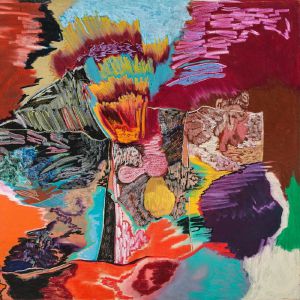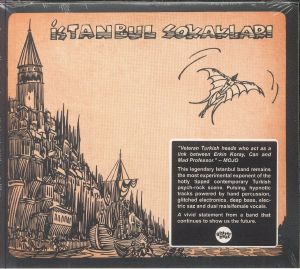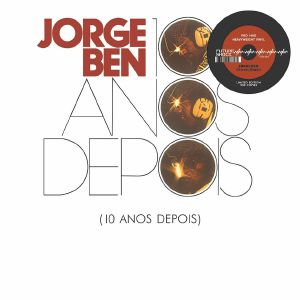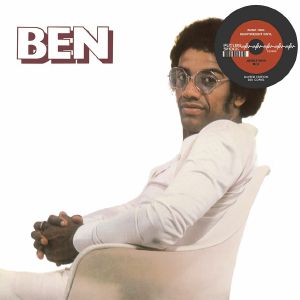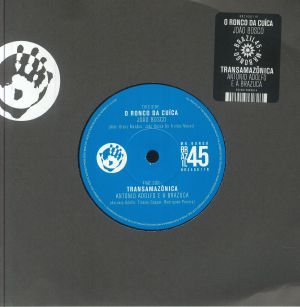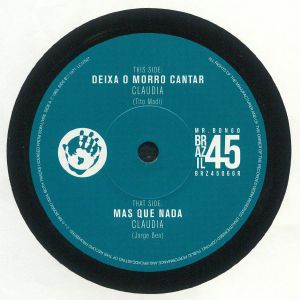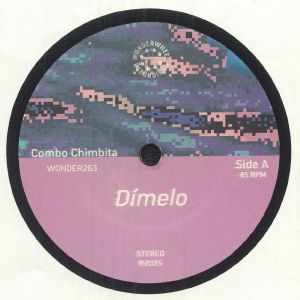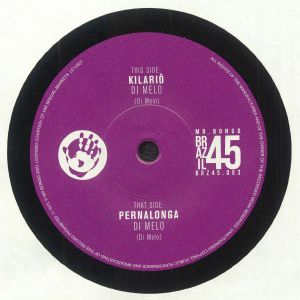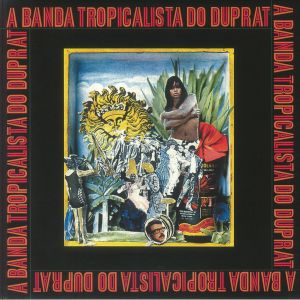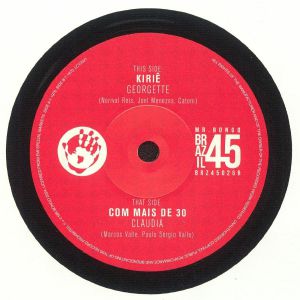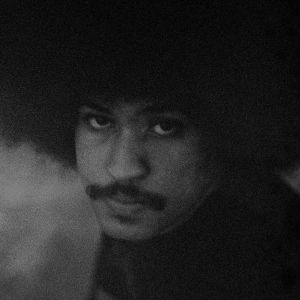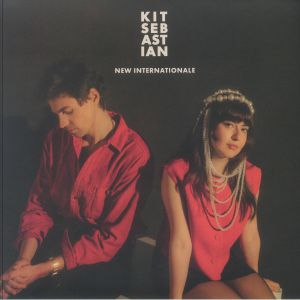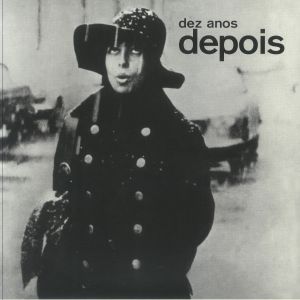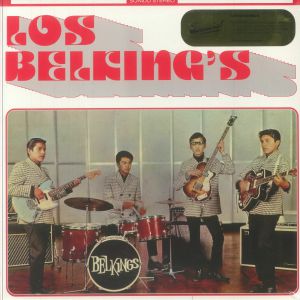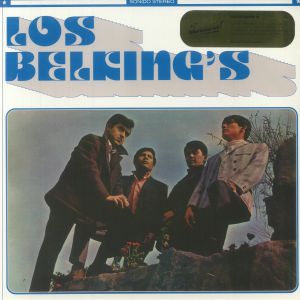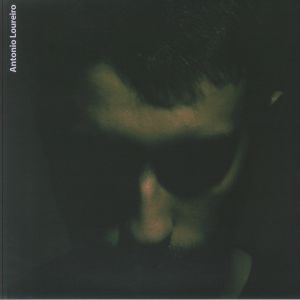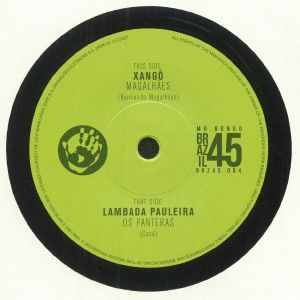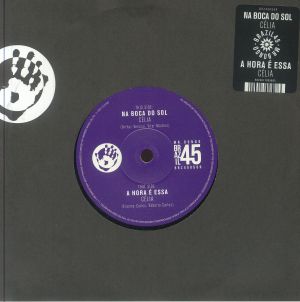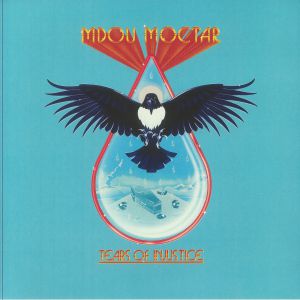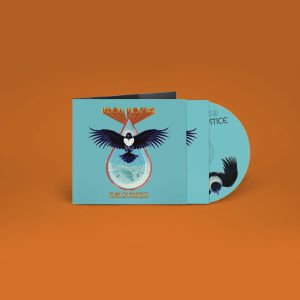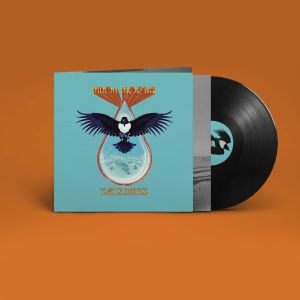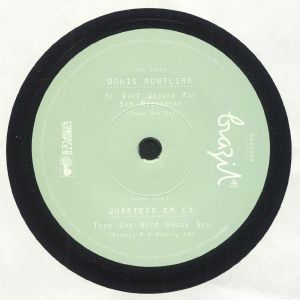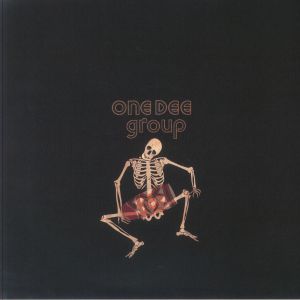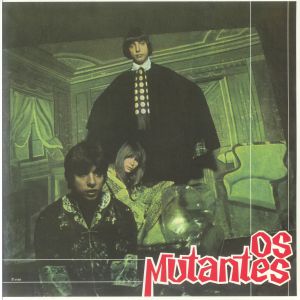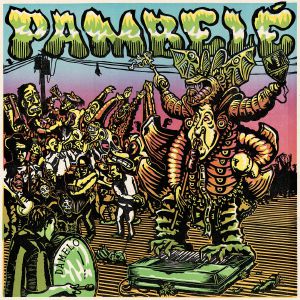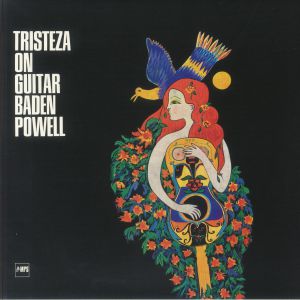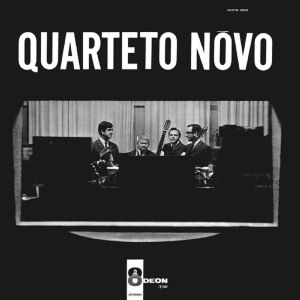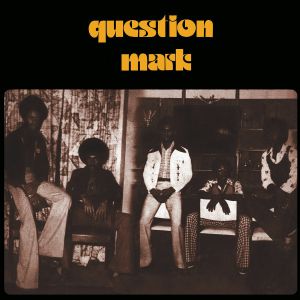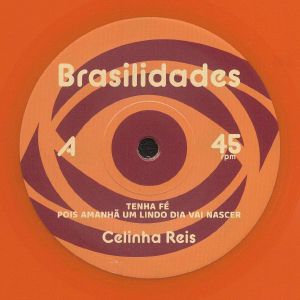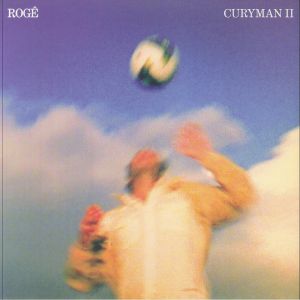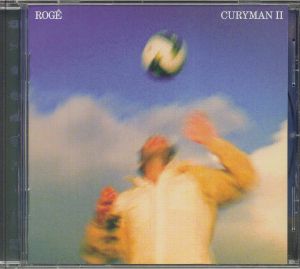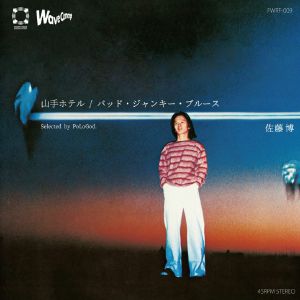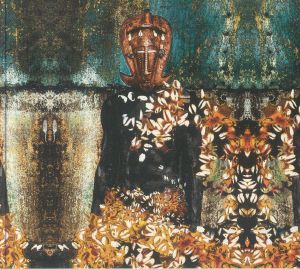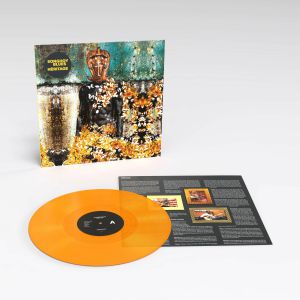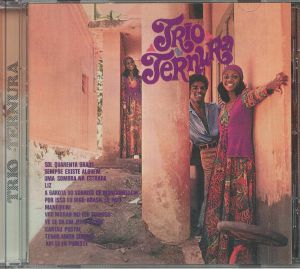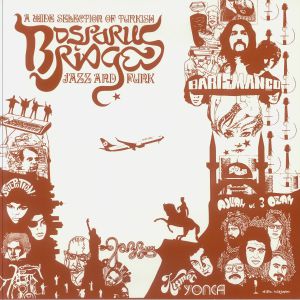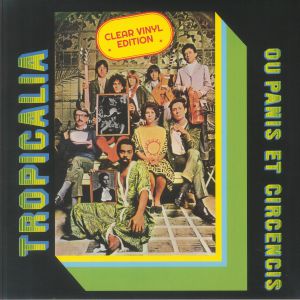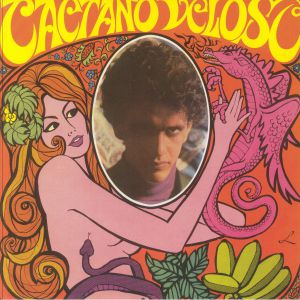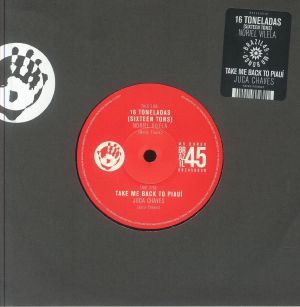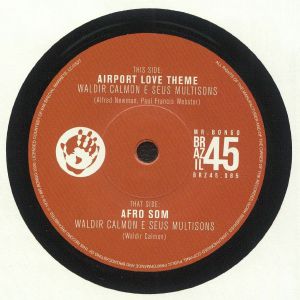Filter
在庫状況
レーベル
Featured
リリースタイトル
値段
1~47/47(ページ1/1)の商品
Anaiis & Grupo Cosmo (milky vinyl LP in debossed sleeve (indie exclusive))
Cat: 5DB 24008LPX. Rel: 23 Jan 25
Review: The forthcoming collaboration between anaiis and Grupo Cosmo presents a captivating fusion of contemporary soul and Brazilian musical traditions. The album features tracks like 'Toda Cor' and 'Voyage,' which blend anaiis's soulful vocals with Grupo Cosmo's rich instrumentation, creating a sound that is both innovative and deeply rooted in cultural heritage. This milky vinyl LP offers listeners a unique auditory experience, highlighting the seamless integration of diverse musical styles.
… Read more in stock $28.57
in stock $13.59
Review: BaBa ZuLa, Istanbul's most experimental band, continues to push the boundaries of Turkish psych-rock. Known for their hypnotic blend of Turkish percussion, electric saz, and electronic elements, they've gained a cult following across the globe. With influences from legends like Einsturzende Neubauten and Can, their latest album Istanbul Sokaklari is a sonic and political statement. Combining deep rhythms, glitchy electronics and dual male-female vocals, BaBa ZuLa's music transports listeners into a world where tradition meets modernity, offering a glimpse into both the future and the heart of Istanbul's streets.
… Read more in stock $25.24
Review: As you can probably work out from the title, this one is the tenth album from Brazil's samba king and genre game-changer Jorge Ben (it makes a change from him calling most of his albums 'Ben' to be honest.) It came first back in 1973 and features a collection of his then-most popular songs. All of them come from the first decade of his career but were all rerecorded as medleys. They bring with them sunny melodies and his signature stuffing grooves, acerbic and witty lyrics and easy to get lost in rhythms.
… Read more in stock $19.41
Review: Jorge Ben is one of the most influential Brazilian artists of his era. The so-called samba king brought all new rule-breaking style to the genre - both musically and lyrically - and fomented his own freeform acid-samba spin-off over the course of an impossibly high number of albums. One of the problems is that many of them were all given the same name, including this one, Ben. Fortunately which ever one you pick up there is joy to be had. Here there are plenty of psychedelic head twisters such as the opener 'Morre O Burro Fica O Homem' as well as deer, more soulful cuts like 'Fio Maravilha'.
… Read more in stock $21.07
Cat: BRZ45 011R. Rel: 20 Nov 24
Review: The reissue of Joao Bosco's 'O Ronco Da Cuica' alongside Antonio Adolfo E A Brazuca's 'Transamazonica' captures a slice of Brazil's musical brilliance. Bosco's track, originally from his 1976 album Galos de Briga, pulses with vibrant cuica rhythms, soulful vocals, and delicate acoustic guitar. On the flip side, Adolfo's 'Transamazonica' is a stunning piece of Brazilian jazz fusion, rich with dynamic instrumentation. This release brings these timeless Brazilian gems to a new audience, reintroducing their infectious grooves and intricate musicianship.
… Read morePlayed by: ISOUL8 (Volcov)
in stock $10.82
Taieiras (reissue) (7")
Cat: BRZ 45018R. Rel: 21 Jan 25
Review: The Brazil 45 series is pure gold for lovers of Latin sounds across the funk, jazz and soul spectrum. Each one sells out fats but usually emcees back around, as is the case with this 18th edition. It features Ely Camargo's 'Taieiras' from his Ely's 1972 album Cantos Da Minha Gente and is a lively folk-inspired track sampled famously by DJ Yoda in 2012. Despite recording 12 albums, Ely remains an enigmatic figure whose music is all we have to feed off. On the flip side, Rio sibling trio Trio Esperanca shine with their psychedelic gem from their 1971 self-titled album. Known for their stunning harmonies, the group released seven albums between 1963 and 1975 but this is one of their finest moments.
… Read more in stock $11.93
Review: Mr Bongo take an MPB breather, tempering their recent larger-scale ambition to reissue mammoth Brazilian disco on comp with a 7" side order appetiser of a classic Brazilian MPB track. Celia's 'Na Boco Do Sol' ('At the Mouth of the Sun') is a gestalt slice of slow-samba, bringing with it a dash of torrid soul and telenovela cinematics. The favourite Arthur Verocai collaborator sings of psychic cities and imaginariums of the soul, verifying a well-travelled spirit; Verocai himself, and Vitor Martins, both lend the song a fuzzy phonic with their guitars and strings. And on the B side comes 'A Hora e Essa, the first track from her second self-titled LP: a lively samba-funk workout, doused in jazzy piano licks, strutting guitars and punchy horns.
… Read more in stock $10.54
Review: Two supreme MPB/bossa nova cuts courtesy of Mr Bongo's resident popular-musica plug Claudia. The MPB singer began her career at the tender age of nine and gained recognition in the 1960s. Her repertoire extends to samba and rock, and having put out an extensive suite of LPs, we're more than faithful in Claudia's selective brilliance, not least when it comes to her own catalogue. Here on the A we have 'Deixa o Morro Cantar', which features on Claudia's very first 7", released in 1965 by RGE: a warm, burring, brass-backed beat typhoon. And on the flip side comes her timeless version of the mythic 'Mas Que Nada', a jazzier folk-funk take on the Jorge Ben classic.
… Read more in stock $10.82
Review: 'Deixa Eu Dizer' is a timeless Brazilian classic that was famously sampled by Marcelo D2 on his iconic hip-hop track 'Desafabo' and maybe just as notary, it was also the debut release on Mr Bongo's now much loved Brazil 45's imprint. It originally featured on Cizinha's stunning album of the same name and until Mr Bongo stepped in it had never been available on a 7". 'Deixa Eu Dizer' has been a long-standing favourite with deep diggers despite its mysterious origins and this welcome reissue not only celebrates Cizinha's unforgettable contribution to Brazilian music but also brings this beloved track to a new generation.
… Read morePlayed by: Juno Recommends International
in stock $10.54
Review: Blending hi-NRG and Latin cumbia, Combo Chimbita present a brand new single for Wonderwheel Recordings, 'Dimelo'. Described as an internal dialogue - a sonic representation of what it feels and sounds like to choose yourself - the refrain "Cuando por fin yo me elegi" is heard repeatedly throughout the track, as self-selection is maximised, contra the impossibility of saving others before oneself. The band's Carolina Oliveros says of the song, "however much you love someone, you can't force them to love yourself in the same way - that is love you have to give yourself." The Busy Twist remixes the idea, self-caring through salvos of oily guitar and toe-tapping woodblock shot, hitting like a health kick.
… Read more in stock $10.26
Review: For the 83rd release in their Brazil 45 series, Mr. Bongo presents yet another a gem in the form of two classic tracks by Brazilian soul legend Roberto De Melo Santos, also known as Di Melo. Born in Recife in 1949, Di Melo is celebrated as an icon of Brazilian funk despite a limited discography. His 1975 self-titled debut is a prized collector's item that is widely loved by Brazilian funk fans, breakbeat enthusiasts and sample seekers. This release revives two standouts from that cult album in 'Kilario,' which is a smooth, soulful masterpiece, and 'Pernalonga,' a feel-good tune featuring catchy guitar, horns and a memorable drum break that was famously sampled in 2009's 'The People Tree.'
… Read morePlayed by: Juno Recommends International
in stock $10.54
Cat: PAROLE 106. Rel: 28 Mar 25
in stock $22.18
Review: Mr. Bongo provide a stark slice of Brasiliera with a split 7" tackling star works from scene-fellows Georgette and Claudia, making up the 26th release in their esteemed Brazil-themed series. For this one, the label home in on two firm favourite artists of the 70s Rio scene, whose same two featuring tunes have already been released side-by-side by the label in 2015: Brazilian samba singer Georgette, whose 'Kirie' brings tense suspended flavours to a lively, formerly hard-to-obtain album cut from 1976; and fellow MPB vocalist Claudia's 'Com Mais De 30', a cover of Marcos and Sergio Valle's original version, which commands a springy downbeat and vocal echo. Both made famous again by their selections by various present day popularisers such as Four Tet and Gilles Peterson, Mr. Bongo clamp their mitts on the fervour once more.
… Read more in stock $12.49
Played by: Juno Recommends International
in stock $13.59
in stock $25.80
Dez Anos Depois (reissue) (gatefold 180 gram audiophile vinyl 2xLP)
Cat: MOVLP 3817. Rel: 04 Feb 25
Review: Nara Leao takes a reflective journey through her musical career with this stunning double album, originally released in 1971. Recorded in both Paris and Rio de Janeiro, it's an intimate collection of reinterpreted classics, showcasing Leao's gentle yet emotionally powerful vocals. The album features timeless tracks like 'Chega de Saudade', 'O Barquinho', and 'Corcovado', each stripped back to its essence with minimalist acoustic arrangements. Leao's voice shines throughout, capturing the nuances of these beloved songs with a delicate touch and heartfelt sincerity. The involvement of guitarist Tuca, known for her work with Francoise Hardy, adds another layer of depth to the recordings, her playing complementing Leao's vocals with sensitivity and grace.
… Read morePlayed by: Juno Recommends Jazz
in stock $39.66
in stock $31.06
in stock $31.06
in stock $44.93
Review: The charming 'Xango' by Magalhaes from his 1986 album E Sua Guitarra on Gravasom Records is an electrifying Lambada track with haunting vocals and infectious energy that now gets reissued as part of the superb series from Mr Bongo. It is a guaranteed dancefloor rescuer for DJs worldwide and has in fact been building momentum in recent years. It remains a favourite for its driving rhythm and captivating intensity and on the B-side is 'Lambada Pauleira' by Os Panteras, which was released in 1987 on Gravasom. Known for Joutro Mundo's popular re-edit, this original version stands out with its quirky charm and undeniable appeal and is a staple for renowned Brazilian DJs, including Augusto Olivani (aka Trepanado).
… Read more in stock $9.43
Review: The wonderful Brazil 45 series from Mr Bongo is back with its big old torch to shine a beam of deserving attention on two standout funk and bossa nova tracks from Rosa Maria, which originally came in 1972 and have remained in demand ever since. The A-side, 'Deixa Nao Deixa', blends Afro-Latin guitar, wild horns and percussion with infectious vocal harmonies that all coalesce into a Brazilian funk classic. On the B-side, 'Avenida Atlantica' delivers alternating funk and bossa beats beneath layers of vocals, horns and percussion to bring big energy and dancefloor-ready heat. This reissue ensures these timeless tracks become available for your rotation once more.
… Read morePlayed by: ISOUL8 (Volcov)
in stock $8.69
Review: Nigerian singer, songwriter, and guitar legend, Mdou Moctar should need no introduction if you keep an ear to the ground of sub-Saharan African music. Then again, the vague region covers a vast area - land in all four hemispheres and around 15% of the Earth's walkable surface. So you could be forgiven for missing out on an individual artist if, for example, you weren't already looking for them specifically. Or relied on Western culture media for tips on what to hear next. That said, problematically tunnel-visioned as the North Atlantic-hegemony of commentators can be, Moctar has been something of a darling to UK, European and US musos for a while now. On Tears of Injustice he presents a convincing case for their continued adoration. A master of Tuareg, a style of music also known as desert blues, it's an intoxicating sound that easily transports and invokes, even if the predominantly Tamasheq language he sings in remains a mystery - arguably another factor in the powerful mythology surrounding his legacy.
… Read more in stock $24.96
in stock $11.09
Review: Mdou Moctar's reimagining of his work presents a powerful counterpoint to the blistering original. Recorded in the wake of a political crisis that left the band stranded in the US, this acoustic version strips back the aggression, replacing it with raw grief. The band, recording in Brooklyn's Bunker Studio, brings a new, meditative quality to the music, with the songs remaining heavy but haunting in their unamplified form. The standout 'Imouhar' takes shape through two rapid-fire passes, seamlessly merged into one hypnotic take. Where the original album burned with anger, this version captures the sadness and sorrow of a nation caught in perpetual turmoil.
… Read more in stock $23.58
Se Voce Quiser Mas Sem Bronquear (limited 7")
Cat: BRZ45 09. Rel: 08 Jan 25
Review: Mr Bongo's Brazilian 45 series hits it's ninth gear with two region-defining slices of sun-kissed samba soul. Doris takes the lead with delicate frontage. Leading from the front, all instruments follow her cues and mirror each vocal flourish with mild big band cheekiness. The instantly distinctive "Tudo Que Voce Podia Ser" from sister quartet Quarteto Em Cy is a great twist on a Latin classic with its slightly rocky guitars and full bodied harmonies. Previously released in 1972, a return has been long overdue.
… Read more in stock $12.49
Played by: Juno Recommends International
in stock $26.35
in stock $31.06
in stock $25.51
Review: The Pambele band's debut album blends Afro-Colombian influences taken from their shared heritage with the vivid sounds of 60s psychedelic rock. It's a work rich in "Caribbean creolisation" with traditional Colombian percussion, joyful, rhythmic vocals and intricate guitar melodies all underpinned with wild organ tones. This powerful cross-fertilisation creates a transatlantic but also distinctly Caribbean sound that draws you into a world of exuberant musical atmosphere. The tunes often get you into a trance-like state while combining raw improvisation and dancey rhythms. It's an authentic escape to a very distant part of the world but one with a universal sense of rhythm that cannot be escaped.
… Read more in stock $27.19
Tristeza On Guitar (reissue) (gatefold translucent red vinyl LP + insert)
Cat: 402975 9200444. Rel: 31 Oct 24
in stock $38.00
Review: This first outing on the new Jazzybelle label marks the first reissue in 25 years of Quarteto Novo's legendary Brazilian jazz album licensed from Universal Music Brazil. A fusion of northeast Brazilian music, bebop, jazz and folk creates a wonderfully alive and arresting organic sound from the influential group which features Hermeto Pascoal, Airto Moreira, Theo De Barros and Heraldo Do Monte. Quarteto Novo released only one album yet left a significant impact on Brazilian music after originally forming as "Trio Novo" for a live event. They gained popularity through a tour led by Geraldo Vandre in 1966 and this historic album was a real highlight of their early years.
… Read more in stock $40.22
Review: Released in 1977, this Nigerian rock album remains a hidden gem, rediscovered by a new generation thanks to recent reissues. Produced by Odion Iruoje, the album features a group of college students whose music captures the vibrant, post-civil war Nigerian rock scene. With a sound that blends Western rock influences like The Beatles, Buffalo Springfield and early Genesis with a distinct African touch, the album is a joyful yet melancholic exploration of love and harmony. Tracks like 'Love', 'Be Nice to the People' and 'Mary Enne' showcase the band's signature blend of fuzz guitar and heartfelt vocals. The music resonates with the exuberance of other African bands like Blo and Witch, yet it stands out with its heavy fuzz guitar and English vocals, steering clear of political or social activism in favor of pure, emotional expression. This album, recorded in Kenya, captures a moment in history when African rock was evolving, bridging cultures and sounds. It's a timeless piece, equally nostalgic, fresh and perfect entry point into African psychedelia for new listeners and a rewarding revisit for those already familiar with the genre.
… Read more in stock $31.34
Tenha Fe Pois Amanha Um Lindo Dia Vai Nascer (limited orange vinyl 7")
Cat: B 1. Rel: 13 Nov 24
Played by: Juno Recommends International
in stock $18.58
Curyman II (limited lemon wave vinyl LP + booklet)
Cat: DWR 006LPC1. Rel: 21 Nov 24
Review: Get ready for the release of Curyman II, Roge's eagerly awaited album, arriving via Diamond West Records. This record has collaborations with esteemed musicians, blending the essence of Brazilian music with innovative elements. It promises to be both a homage and an evolution of Roge's distinctive sound. As a Latin Grammy-nominated and Brazilian Music Awards-winning artist, Roge has become a key player in the revitalization of Musica Popular Brasileira (MPB). Over his two-decade career, he has released seven solo albums, establishing his presence in the contemporary Brazilian music landscape. His U.S. debut, CURYMAN, released in 2023, was produced by Thomas Brenneck of the Budos Band, known for his work with icons like Lady Gaga and Beyonce. This album celebrated samba while conveying themes of resilience and redemption. With Curyman II, Roge aims to build on the momentum of his previous success, delivering even more dynamic samba rhythms and insightful lyrics.
… Read more in stock $38.55
Review: Curyman II, set for release via Diamond West Records, is the highly anticipated follow-up to Roge's US debut album. This album honors the roots of Brazilian music while pushing its boundaries, showcasing Roge's evolution as an artist. Collaborating with legendary figures such as Seu Jorge and Arthur Verocai, who arranged strings for both Curyman albums, Roge creates a vibrant tapestry of sound that bridges the past and future of Brazilian music. With a career spanning over two decades and multiple accolades, including a Latin Grammy nomination, Roge is a pivotal figure in the resurgence of Musica Popular Brasileira (MPB). His previous release, Curyman, produced by Thomas Brenneck of the Budos Band, celebrated samba infused with messages of resilience and hope. Curyman II promises to build on this success, delivering even more infectious samba rhythms and thought-provoking lyrics. As Roge continues to evolve, he remains dedicated to sharing Brazil's rich cultural heritage with audiences worldwide, making this album an exciting invitation to immerse in his soulful musical world once again.
… Read morePlayed by: Juno Recommends International
in stock $14.15
Review: Fourth Wave reissue one of the great works of Japanese composer, keyboardist and producer Hiroshi Sato. Forming part of a fresh flood of reissues that the label have explicitly mandated, Sato's are highlights among a discrete period of exquisitely recorded and visually designed LPs from the late 70s and early 80s. With a sleekly surreal cover artwork by Tadanori Yokoo - psych rock's pastiching answer to Vaughan Oliver - Sato brought chilled finger-flair to his various recorded synth patches, electric pianos, chamber brasses and guitars, all of which are recorded to produce a precise, razored sound in xpander-funk. Something latent - something much more - than mere smooth AOR is conveyed here. Perhaps it can be focalised in the LP's aura of effortless, disengaged mellowness, as if good comportment and style is an inevitability of life in cosmopolitan 80s Tokyo.
… Read more in stock $22.18
Cat: BRZ 45012R. Rel: 21 Jan 25
Review: The 12th release on Mr. Bongo's signature 45s series saw a reissue of two foundational releases in Brazil's modern popular music category; now the record hears a second round, fresh again off the master metal lacquer. On the A, we hear Brazilian samba luminary Elza Soares covering Jorge Ben's classic 'Mas Que Nada' - albeit with a hoarser vocal tone, such was Soares' signature voice, one which only led to a whopping 34-album career. B-sider Elizabeth, by contrast, upholds a mystery; the artist was nicknamed "Gatinha do Mato" ("jungle cat"), and recorded 'Vou Falar-Lhe Francamente' at some indeterminate point in 1960s Sao Paolo, when and where Brazilian local styles blended with funk and rock.
… Read morePlayed by: Pete Haigh
in stock $12.49
in stock $12.19
Heritage (limited translucent orange vinyl LP)
Cat: TRANS 797X. Rel: 16 Jan 25
Review: With their fourth album, the celebrated rock group from northern Mali, take a bold step forward, evolving their signature "desert blues" style into a more acoustic, introspective sound. Recorded in Bamako with producer Paul Chandler, the album blends the band's gritty, electrifying energy with traditional Malian influences, incorporating instruments and melodies from various ethnic traditions. The result is a vibrant, collaborative work that features contributions from renowned artists like Afel Bocoum, Rokia Kone and Neba Solo. Tracks like 'Issa', which translates to 'river', demonstrate the group's deeper exploration of acoustic textures and storytelling, drawing on the power of nature and migration. The song's early delta blues-inspired guitar riffs complement the band's passionate vocals. The band's ability to honour their cultural roots while embracing new musical horizons really shows well here. The album is both a celebration of their heritage and a bold look towards the future, marking another remarkable chapter in Songhoy Blues' already impressive catalogue.
… Read more in stock $26.61
in stock $15.26
VARIOUS
Cat: LIFE 058. Rel: 23 Jan 25
in stock $20.81
in stock $24.68
in stock $26.07
Cat: BRZ 4503R. Rel: 20 Nov 24
Review: Mr. Bongo's Brazil.45 continues with a repress of two highly sought-after tracks from earlier in the series, this time from Noriel Vilela and Juca Chaves. On the A-side, Vilela's 1971 cover of Tennessee Ernie Ford's '16 Tons' transforms the classic American folk song into a smooth, samba-infused groove. Vilela's version reimagines the track which was originally released on Copacabana Records, with a deep rhythmic flair. On the B-side, Juca Chaves' 'Take Me Back To Piaui' from 1970 featured on his 1972 album Muito Vivo delivers lush orchestration, velvety vocals and vibrant cuica tones. It's pure escapist bliss.
… Read more in stock $10.82
Cat: BRZ45 085NB. Rel: 01 Nov 24
Review: Waldir Calmon's 'Airport Love Theme' has that special appeal that makes it a true gem. Sampled by Madlib on the Madvillain album track 'Curls', this lounge classic from Calmon's 1970 Waldir Calmon E Seus Multisons LP on Copacabana exudes nostalgic charm. Despite its unassuming cover, 'Airport Love Theme' delivers a dreamy, feel-good vibe that could soundtrack a perfect world. Afro Son, from the same album, shifts towards a Brazilian-rooted, cinematic groove, reminiscent of Jean Jacques Perrey's E.V.A.. Calmon, a Brazilian music fixture from the 50s to the 80s, who collaborated with legends like Tom Jobim and Joao Gilberto and left a unique musical legacy that lives on in these timeless tracks.
… Read morePlayed by: Juno Recommends International
in stock $10.82
in stock $20.53
1~47/47(ページ1/1)の商品

 USD
USD





